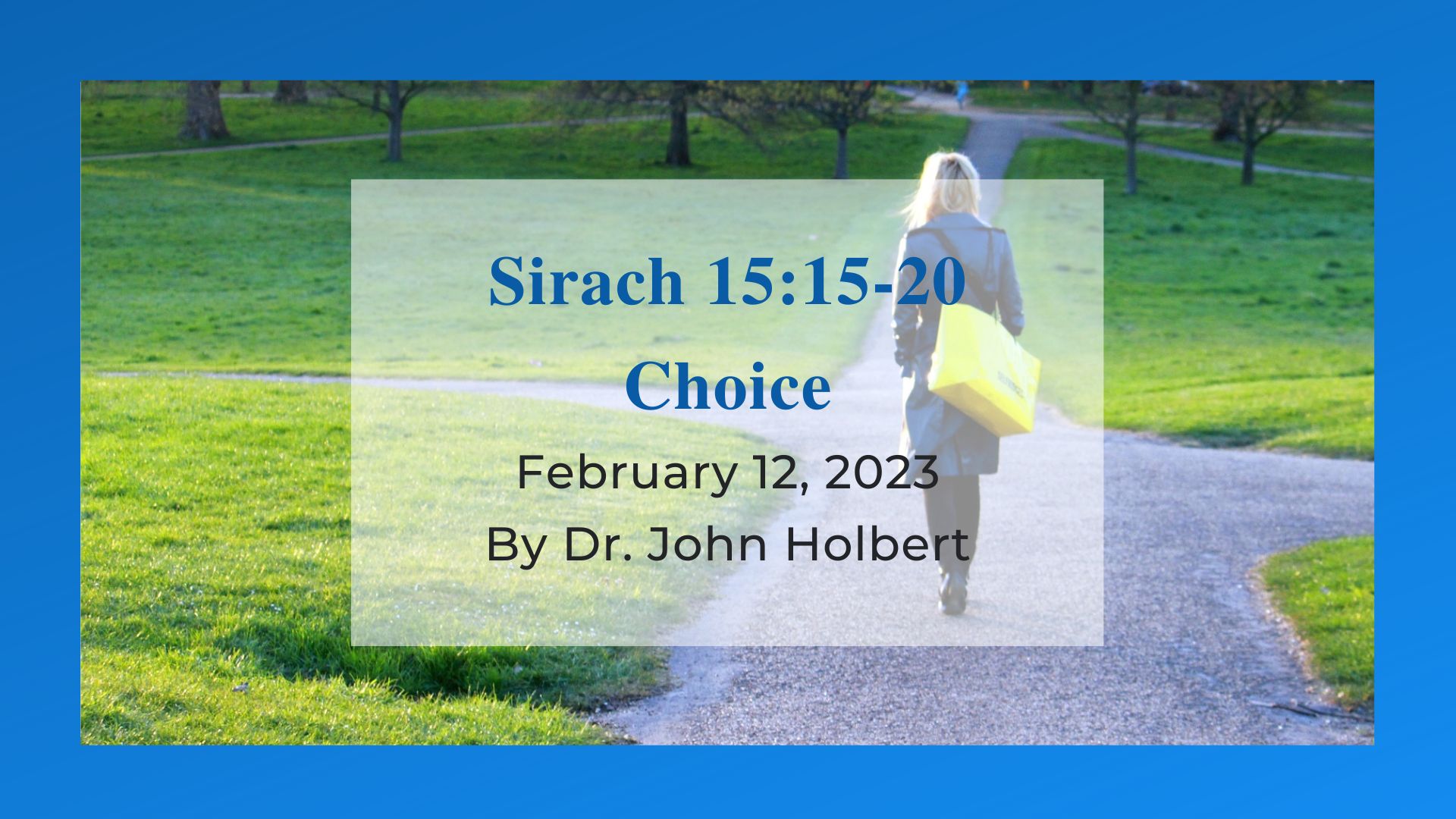Choice - Reflections on Sirach 15:15-20
by Dr. John Holbert on Tuesday, February 7, 2023

Choice
Sirach 15:15-20
The Peripatetic Hebrew Bible Preacher
I thought it would be useful if we turned our attention this Sunday to a very important book, if hardly well-known by many, from the Hebrew Apocryphal literature, The Wisdom of Ben-Sira. It is variously known as Sirach in the Greek manuscripts, or Ecclesiasticus, the Latin title, meaning something like “the church book.” The book was written sometime in the 2nd century BCE, but surely before 175BCE, because there is no mention in its many pages of the painful years of the rule of Antiochus III Epiphanes over Israel (175-164BCE), and the subsequent revolt against that Greek ruler in the last year of his reign. Hence, Sirach was certainly composed before those years, early in the 2nd century.
The book has been a very popular one both for Jews and Christians, leaving a profound impact on the proverbial literature of the West. It is filled with moral, cultic, and ethical maxims, folk proverbs, psalms of praise and lament, theological and philosophical reflections, homiletic exhortations, and rich comments about life and customs of the time. Yet, since the book was relegated to the Apocryphal literature, not making it into the canon of Scripture that we employ today, its usage has been minimal, and it remains largely unknown among readers of Scripture. This is an unfortunate reality since the book contains any number of valuable and insightful passages that bear close study.
Today’s text, Sirach 15:15-20, has a rich reflection on the issue of human choice, as that is or is not directed by God. Those Christian traditions that have long believed that God pre-determines our choices, will find little comfort in Sirach. This author affirms clearly and unequivocally that human beings possess real choice in the decisions they make, while at the same time confessing that God is “mighty in power and sees everything,” and “knows every human action” (Sirach 15:18-19). Though God’s power and vast wisdom are made plain, that wise power is never employed to lead us to one choice or another. In no way does God direct human choice, but does certainly offer real choices. “If you choose, you may keep the commandments; to act faithfully is a matter of your own choice” (Sirach 15:15).
This issue of freedom of choice and God’s determination of choice is a very old one. I would suggest that the ancient tale of the Garden of Eden in Gen.3 offers a telling example. The tree of knowledge in the middle of the garden possesses fruit (not apples!), the eating of which can “make a person wise,” according to the snake. However, according to the divine warning, “the day you eat of it you die.” There is no neon sign in front of that tree, blinking “eat at Joe’s” or “avoid at all costs.” God simply plants the tree and bids the humans God has created to choose. Their choice to eat—both of them so choose—leads both to knowledge and to expulsion from the garden, a complex result, perhaps both necessary and dangerous.
Likewise in Sirach 15:16 we read that “God has placed before you fire and water; stretch out your hand for whichever you choose.” Well, your choice will depend on your current need. If I am thirsty and hot, I will reach for water, but if I am cold and in need of a source of light in the darkness, I will choose fire. But it is definitely my choice. And more importantly, God says, “Before each person are life and death, and whichever one chooses will be given” (Sirach 15:17). That is, each human is called on to live a life of faithfulness to God, a life that leads to rich living. Yet, each human may also freely choose ways of living that lead to death, chaos, and broken relationships.
And this vital choice is once again not determined by God. “God has not commanded anyone to be wicked, and has not given anyone permission to sin” (Sirach 15:20). The wicked among us act so by choice, and those who sin have chosen that way to pursue their life; God has neither commanded any of that activity nor has God determined it beforehand. Choice is real and choice is free.
Such a clear presentation of the crucial idea of free choice is important as we conclude the season of Epiphany and move toward Lent. The Lenten season focuses regularly on introspection, on the ways we choose to live our lives before God and one another. Those ways, reminds Sirach, are not determined by God, but are the result of our choices. Those of us who are United Methodists well recall the struggle that our founder, John Wesley, had with those believers who were convinced that God had determined beforehand all of our actions. Wesley would have none of that, and argued for much of his life that free will was the very essence of what it meant to be human. One of the reasons I became a Methodist—I was not born into it—was precisely this emphasis on freedom of choice. I can only agree with Sirach on the matter—we are free to choose, and in the presence of the God of wisdom and power, we are asked to choose wisely and faithfully.
